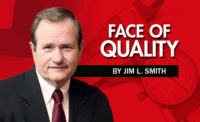Successful Quality Professionals Go Beyond Normal

If anyone has been in quality for some time, they have probably encountered managers who have painful connections to quality. It is likely that some managers would describe their experience as overwhelmingly negative. Some of these people extend these feeling into anything having to do with quality.
As a matter of survival, people instinctively remember painful experiences more than pleasant memories. Performing a quality function is often a dirty job, but somebody has to do it!
So, how does a quality professional make a meaningful contribution when the nature of what we have to offer (information about product quality defects, poorly performing processes or customer complaints) has become an irritant to those who should know about them?
Should we sugar-coat the message or disguise the information? Is it sensible to try to change the culture? What will it take for quality professionals to gain acceptance and for important quality information to be welcomed by traumatized leaders?
The following four basic considerations to change the environment are offered to develop more value for yourself and benefit to your organization.
Choose different words:
Choose your words carefully to describe quality information in a different light. Management must hear the bad news but consider presenting quality or regulatory compliance concerns as something other than problems. Instead, identify them as initiatives, opportunities, or preventive actions.
Instead of reducing costs or avoiding waste, consider presenting these situations as opportunities to increase productivity, reduce downtime, and improve timeliness. Demonstrate to management how these improvements will positively affect the bottom line. Words carry great power and influence. Quality professionals can use that power to mutual advantage for themselves and their organizations.
Become bilingual:
Quality professionals must learn that different groups require different messages to bring about change. Quality professionals must be able to communicate to production staff using terms familiar to production departments. We can be effective discussing defects, scrap/rework, inefficiencies, etc., but there is a different language with senior management.
I have had the distinct privilege of being acquainted with several quality giants who reinforced this issue. For instance, I remember a discussion with the late Philip B. Crosby shortly before he passed. Over his many years in quality, Phil remarked, with a smile, that he learned that upper managers were mostly concerned with making money, making more money, and not losing money.
Dr. Joseph M. Juran also reinforced this thought in his famed Quality Handbook where he said that the basic language of senior management is money. At senior management levels, almost everything is discussed in terms of money: income, expenses, dividends, savings, return on investment (ROI), life-cycle costing, and value-added or non-value-added.
Quality professionals, therefore, must be able to monetize quality problems, issues and benefits to effectively communicate them to upper management. Costs must be balanced by benefits. Capital expenses should have low payback periods and/or high ROI.
Actually, if quality professionals wish to survive, their own function must be positively presented as a value-added process in the company. If quality professionals cannot communicate what they have to say to managers in monetary terms, managers will be polite but they will essentially ignore you.
Get over the myth:
There is a myth that many quality professionals have come to believe and base most of their actions on. The myth is that the greatest economic case for quality is resolving the issues of dissatisfied customers.
Organizational research demonstrates that investing in attainment of customer delight, by focusing on better understanding, and fulfilling the needs of quiet customers who are not dissatisfied but merely satisfied, resulted in significantly greater company earnings.
Quality professionals should use quality tools to help move their organization’s silent majority customers from satisfied to delighted and be able to demonstrate the direct relationship between the delighted state and increased profits.
Redefine yourself: Work with your direct management to redefine your new role. With management’s help, adopt a more favorable and representative title.
The more successful and influential quality professionals have repackaged themselves as something more than an enforcer of specifications, standards, and regulations. Everything we touch involves quality so it is worth considering taking quality out of your job title. Replace quality with something like: performance excellence champion, internal customer advocate, continual improvement specialist, customer satisfaction specialist, strategic excellence champion, etc.
You might be doing much of the same things but redefining your role will cause you and others to focus on different outcomes. You might be surprised how the organization will react to the ‘new you.’ You might be amazed to discover managers approaching to ask for your input versus talking about a poor quality issue.
Looking for a reprint of this article?
From high-res PDFs to custom plaques, order your copy today!






